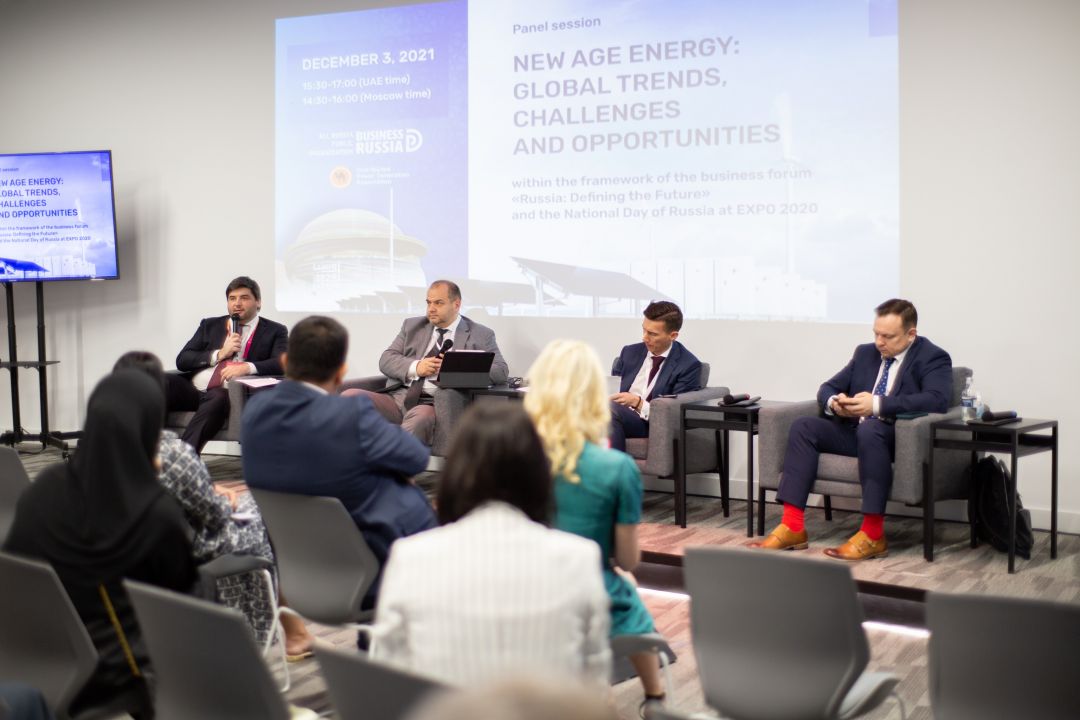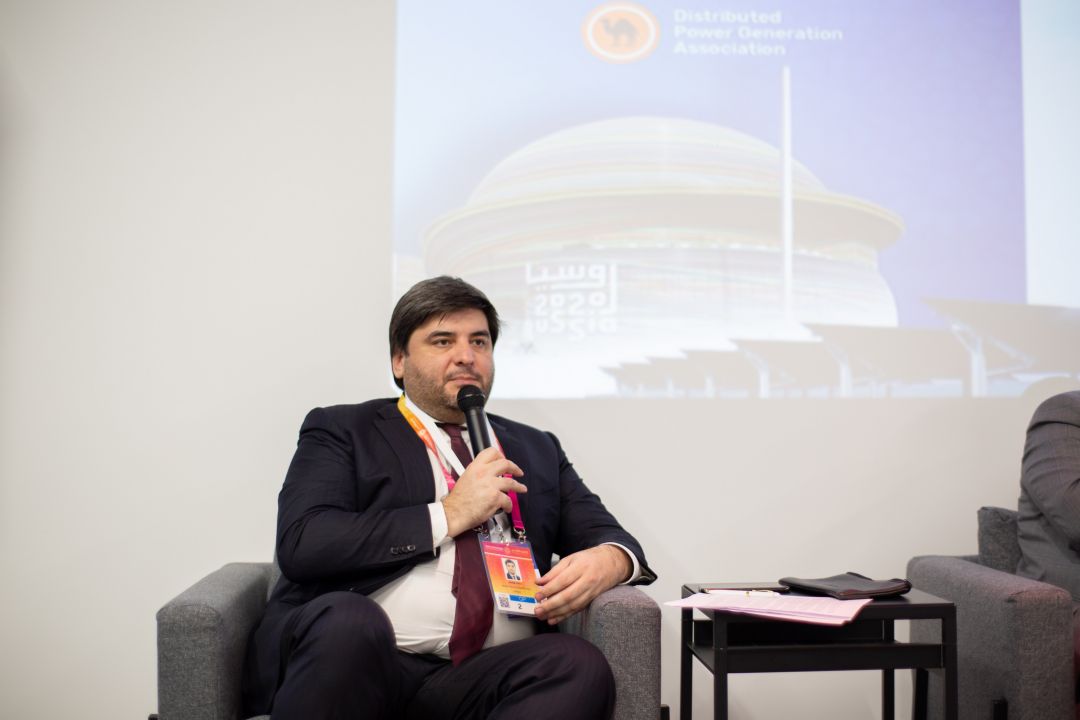On December 3, in Dubai, as part of the Russian Business Forum and the National Day of Russia at the World Exhibition EXPO-2020, the Distributed Power Generation Association and Business Russia held a panel session «New Age Energy: Global Trends, Challenges and Opportunities». The discussion at the main international business venue — the National Pavilion of Russia — was devoted to the topical industry issues. Is a concept of «green energy» a tribute to fashion or a natural scenario for the development of the planet, are renewable energy sources capable of providing consumers with reliable electricity, or does their «intermittent nature» require close coupling with traditional generation? What is more relevant for business — the environmental agenda or energy efficiency? Is Russia ready in technological, and most importantly mental sense, for energy transition?
In his opening speech, Maksim Zagornov, President of the Distributed Power Generation Association and moderator of the discussion, noted that the outgoing year, associated with a new wave of the pandemic, has revealed quite apparent trends — a rigorous environmental agenda backed by most countries of the world; a general trend towards energy transition; the implementation of new technologies aimed at reducing the carbon footprint; and a business request for savings — the result of economic development in the conditions of the coronacrisis.
«All this has posed new challenges to society and business. Energy efficiency was designated as a major goal at the state level. Entrepreneurs, regulators, professional industry communities are constantly searching for new, technically, and economically feasible solutions. And one of such solutions is distributed and renewable energy», noted Maksim Zagornov.
According to experts, different countries possess different potential and starting positions for the development of distributed energy. What is certain is that the development of «green» generation is a long-term trend, and the ESG agenda largely shapes the business strategies of companies. There have emerged leaders along this path: this year, for the first time, Schneider Electric topped the annual index of the 100 world's most sustainable corporations by the Canadian magazine Corporate Knights. Last year, Schneider Electric was ranked only 29th in this index. A sharp leap into the leadership is the acknowledgment of the company's efforts to implement the principles of environmental, social and corporate governance sustainability (ESG).
«In Russia, the sustainable development market is only evolving, but unlike 2-3 years ago when only a few people knew about ESG, nowadays 90% of large businesses design a strategy taking into account the ESG agenda, and 50% of them disclose reports in this area. The main drivers of demand for ESG are international companies in the Russian Federation and Russian exporters. They are followed by their contractors. Short-term climate goals can be achieved with the help of distributed generation: microgrids based on solar panels, wind turbines, biogas-powered gas gensets», claimed Vice president for sustainability services in Eastern Europe at Schneider Electric Sergey Semenov.
Many large industrial consumers end up developing their own generation based on modern «green» technologies, lots of large generating companies start to develop a separate business in the sphere of distributed and renewable energy. For example, in Rosatom's portfolio there are already 1.7 GW of wind capacity. The Corporation is in search of the perfect balance between the concepts of «green», efficient, and affordable electricity.
«The key global sustainable trend in the energy sector is a request for «being green». Nuclear power is certainly considered green. For example, according to the latest study by the United Nations Economic Commission for Europe, nuclear power plant is the source of electricity with the lowest CO2 emissions. In the conditions of increasing energy consumption, another requirement for modern energy is being formed — to be not only green, but also reliable. Nuclear power is also on trend here — the low share of the fuel component in the cost of nuclear generation allows us to forecast prices for almost 100 years ahead», emphasized the President of Rusatom International Network Vadim Titov.
Large industrial corporations also seek an optimal balance between a request for environmentally friendly production and an increase in energy efficiency. Mikhail Sutyaginsky, Chairman of the Board of Directors of JSC Titan Group of Companies, member of the Coordinating Council of Business Russia, talked about the adjustments made in the approaches to business caused by the new environmental and economic agenda.
«The Titan Group of Companies — one of the largest corporations of the petrochemical complex of Russia — always pays considerable attention to the environmental factor when implementing new projects. This applies not only to production processes, but also to energy supply issues. At the moment, renewable energy technologies are being introduced at the Group's enterprises, while traditional sources of generation still hold key positions», said Mikhail Sutyaginsky.
As experts noted in the course of discussion, the oil and gas industry had also begun to change under the influence of a rigorous environmental agenda. One of the key trends is that more and more oil and gas companies are undertaking commitments to reduce greenhouse gas emissions by 2050. At the same time, a substantial part of the long-term strategies of each industry player is the use of hydrogen and CCUS (carbon capture and subsequent utilization systems aimed at reducing its presence in the atmosphere). Another driver for the implementation of energy projects is the further development of liquefied natural gas technologies, which make it possible to provide fuel for distributed generation facilities in remote regions.
«We should understand that hydrocarbons will remain. Even by 2050, gas and oil will have constituted a bulk in the global energy balance. Meanwhile, new trends - liquefied natural gas and hydrogen - will be actively developing», the President of the National Association of Oil and Gas Services Victor Khaykov said.
Speaking at the session, Maksim Gubanov, Head of Energy and Housing Division of the Russian Far East and Arctic Development Corporation, highlighted the huge investment potential of distributed generation projects in remote and isolated areas of the macroregion.
«There are more than a thousand distributed generation facilities operating on the territory of the Far East and the Arctic, which provide local energy supply to settlements based on the use of diesel, coal and fuel oil. Modernization of these facilities with the introduction of advanced energy technologies is a priority state task. Besides, it is necessary to ensure guaranteed energy supply to new investment projects for the development of minerals and the creation of industrial production away from centralized energy infrastructure. In total, the implementation of these projects will require more than 300 billion investments. The Far East and Arctic Development Corporation is systematically engaged in creating conditions for the development of business in the field of distributed generation in the Far East and the Arctic and invites all interested companies to cooperate», said Maxim Gubanov.
During the discussion, the experts also noted that the development of «green» generation is not free from pitfalls. Not coincidentally, renewable energy is called «intermittent alternative generation» — the fact is that it is not dispatchable. In other words, since a human is not able to control the weather, the dispatcher of the system operator cannot predict when there will be enough sun and wind. The behavior of such sources is always in question.
«By achieving the Sustainable Development Goals, we will automatically solve the problems related to global climate change. Thus, everyone who calls on the whole planet to focus on energy transition tries to distract us from the remaining 16 Sustainable Development Goals, including ensuring access to reliable and sustainable energy sources», claimed editor-in-chief of the analytical online portal Geoenergetics INFO Boris Marcinkevich.
Summing up the discussion, Maksim Zagornov, President of the Distributed Power Generation Association, noted that energy development issues underpin the development of any country. After the end of the pandemic period, Russia expects an active growth of production, which means that energy supply issues will come to the fore.
«Surely, the environmental agenda dictates its trends, but the target model of energy supply to consumers is impossible without improving energy efficiency. The crisis years demonstrate that business is beginning to pay more and more attention to such factors as saving resources and efficient use of investments. Reasonable selection of energy sources is not only the key to the successful fulfillment of environmental obligations, but also, above all, to the economic and technical comfort of consumers, both industrial and domestic», summed up the discussion Maksim Zagornov.



 +971 58 554 0879
+971 58 554 0879 info@tradehouse-rus-uae.com
info@tradehouse-rus-uae.com











